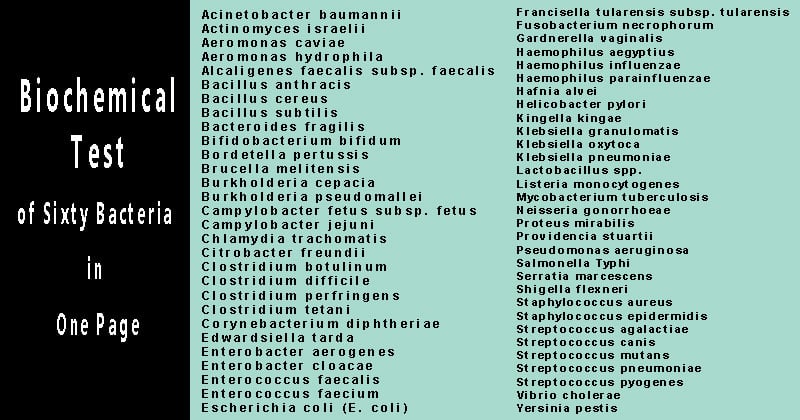Biochemical reactions are significant in the identification of bacterial isolates and in the identification of different bacterial species. These tests depend on the presence of certain enzymes, such as catalase, oxidase, urease, gelatinase, etc., produced by the bacteria.
Different bacteria produce varying spectra of enzymes. For example, some enzymes are necessary for the bacterium’s individual metabolism, and some facilitate the bacterium’s ability to compete with other bacteria or establish an infection. Tests that measure single bacterial enzymes are simple, rapid, and generally easy to interpret. They can be performed on organisms already grown in culture and often provide presumptive identification.

Interesting Science Videos
Click on the link below to learn the biochemical reactions of specific bacteria.
-
Biochemical Test of Acinetobacter baumannii
-
Biochemical Test of Actinomyces israelii
-
Biochemical Test of Aeromonas caviae
-
Biochemical Test of Aeromonas hydrophila
-
Biochemical Test of Alcaligenes faecalis subsp. faecalis
-
Biochemical Test of Bacillus anthracis
-
Biochemical Test of Bacillus cereus
-
Biochemical Test of Bacillus subtilis
-
Biochemical Test of Bacteroides fragilis
-
Biochemical Test of Bifidobacterium bifidum
-
Biochemical Test of Bordetella pertussis
-
Biochemical Test of Brucella melitensis
-
Biochemical Test of Burkholderia cepacia
-
Biochemical Test of Burkholderia pseudomallei
-
Biochemical Test of Campylobacter fetus subsp. fetus
-
Biochemical Test of Campylobacter jejuni
-
Biochemical Test of Chlamydia trachomatis
-
Biochemical test of Citrobacter freundii
-
Biochemical Test of Clostridium botulinum
-
Biochemical Test of Clostridium difficile
-
Biochemical Test of Clostridium perfringens
-
Biochemical Test of Clostridium tetani
-
Biochemical Test of Corynebacterium diphtheriae
-
Biochemical Test of Edwardsiella tarda
-
Biochemical Test of Enterobacter aerogenes
-
Biochemical Test of Enterobacter cloacae
-
Biochemical Test of Enterococcus faecalis
-
Biochemical Test of Enterococcus faecium
-
Biochemical Test of Escherichia coli (E. coli)
-
Biochemical Test of Francisella tularensis subsp. tularensis
-
Biochemical Test of Fusobacterium necrophorum
-
Biochemical Test of Gardnerella vaginalis
-
Biochemical Test of Haemophilus aegyptius
-
Biochemical Test of Haemophilus influenzae
-
Biochemical Test of Haemophilus parainfluenzae
-
Biochemical Test of Hafnia alvei
-
Biochemical Test of Helicobacter pylori
-
Biochemical Test of Kingella kingae
-
Biochemical Test of Klebsiella granulomatis
-
Biochemical Test of Klebsiella oxytoca
-
Biochemical Test of Klebsiella pneumoniae
-
Biochemical Test of Lactobacillus spp.
-
Biochemical Test of Listeria monocytogenes
-
Biochemical Test of Mycobacterium tuberculosis
-
Biochemical Test of Neisseria gonorrhoeae
-
Biochemical Test of Proteus mirabilis
-
Biochemical Test of Providencia stuartii
-
Biochemical Test of Pseudomonas aeruginosa
-
Biochemical Test of Salmonella Typhi
-
Biochemical Test of Serratia marcescens
-
Biochemical Test of Shigella flexneri
-
Biochemical Test of Staphylococcus aureus
-
Biochemical Test of Staphylococcus epidermidis
-
Biochemical Test of Streptococcus agalactiae
-
Biochemical Test of Streptococcus canis
-
Biochemical Test of Streptococcus mutans
-
Biochemical Test of Streptococcus pneumoniae
-
Biochemical Test of Streptococcus pyogenes
-
Biochemical Test of Vibrio cholerae
-
Biochemical Test of Yersinia pestis

Hello Sir,
I’m Vinay Pradhan from India.
Mu studied MSc Microbiology & Iam current Reasearch Associate bacteriology
very helpful your notes
I m studying your notes time to time
More benifits this notes thank you so much Sir.
I’m working on sulfute reducing bacteria, they were isolated successfully. Please can you help me with manual(s) for their identification?
Many researches were reporting Bergey’s Manual, but i couldn’t find it in the said Bergey Manual of Determinative bacteriology.
please can tell me biochemical test for Bacillus thuringiensis, or can i use Bacillus ceres or others